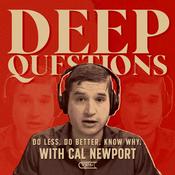137 episódios
- One of the leading voices in transition design for sustainability and societal change, Cameron Tonkinwise, Professor of Design Studies at the University of Technology Sydney, joins us for a deep conversation on what design must become in an era of systemic collapse.
In this episode, he speaks on why the logic that drives most businesses - efficiency, growth, and value capture- is often fundamentally at odds with what people actually want and need, and how this tension is giving rise to alternative value systems that challenge dominant capitalist structures.
We also explore the evolving role of universities as critical spaces for experimentation and sense-making, and why their ability to shape imagination, culture, and future practitioners may be more important now than ever.
As A long-time observer of how design, education, and economic systems co-evolve, Cameron brings a rare ability to connect theory with lived societal consequences.
He explores how design is both an ontological and political practice, shaping how people live, relate, and care for one another.
Drawing on decades of experience in social innovation and design education, he shows why transition is about co-creating shared visions, not delivering pre-defined solutions.
Whether you’re a designer, an educator, or someone curious about how our systems and values could evolve, this conversation is for you.
Key Highlights
👉 Design is not neutral problem-solving; it actively shapes how people live, relate, and understand what is possible.
👉 Most business models are structurally optimised for efficiency and value capture - not for meeting human or societal needs.
👉 Systemic transitions cannot be engineered, scaled, or optimised without losing their democratic and participatory core.
👉Capitalism maintains dominance by presenting itself as the only viable system, while alternative value systems and economies already exist beneath the surface.
👉 What counts as “value” is not fixed; it is produced by institutions, infrastructures, and cultural norms - and can be redesigned.
👉 Universities play a critical role as spaces where future practitioners, imaginaries, and societal norms are formed - their decline risks narrowing the futures we can collectively imagine.
👉 Designers’ unique contribution to transition lies in making change livable at the human scale, not in accelerating adoption or efficiency.
Topics /chapters
(00:00) Is Another World Possible? Transition Design - INTRO
(01:34) Introducing Cameron Tonkinwise
(03:33) Designing Transitions: From Small Interventions to Systems Change
(10:40) Technology, and the Politics of Design
(22:07) What does good design now look like?
(29:05) The Designer’s Role in Interdisciplinary Systems
(34:20) Creating new contexts for care
(49:56) Breadcrumbs and Suggestions
Remember that you can always find transcripts and key highlights of the episode on our website: https://www.boundaryless.io/podcast/tonkinwise-cameron
Episode recorded on Dec 18, 25
Find out more about the show and the research at Boundaryless at https://boundaryless.io/resources/podcast/
Get in touch with Boundaryless:
Twitter: https://twitter.com/boundaryless_
Website: https://boundaryless.io/contacts
LinkedIn: https://www.linkedin.com/company/boundaryless-pdt-3eo
Music
Music from Liosound / Walter Mobilio. Find his portfolio here: https://blss.io/Podcast-Music #132 - Enterprise Architecture: Selling Options for the Future, at a Cost - with Gregor Hohpe
06/1/2026 | 56minGregor Hohpe - one of the world’s leading voices in enterprise architecture and platform thinking, and author of ‘The Software Architect Elevator’, ‘Enterprise Integration Patterns’ and ‘Platform Strategy’- joins us to dive into how enterprise architecture is about navigating the tradeoffs needed to enable future optionality in the organization.
He reframes the architecture problem from a technical one to a practice of selling options, and unpacks why shared language and domain understanding along with strategic clarity matter more than ever now with GenAI.
In this fast approaching future GenAI no longer makes it possible to hide organisational dysfunctions, it exposes them relentlessly: the question then is what leaders and architects can do about this.
In this episode, we succeeded to bring in Gregor’s perspective on architecture as a strategic, systems-level discipline not as a technical practice.
Drawing on his experience as a long-time advisor to large organisations navigating platform transitions, we explore how to bridge strategy and implementation, and how to create coherence across silos, enabling teams to make better decisions together.
Join us as we discuss how architecture guides strategic choices and helps you build optionality.
Key Highlights
👉 Architecture can also be seen as a practice of selling options - enabling organisations to defer decisions and adapt as strategy and context evolve.
👉 Optionality always comes with a cost: more flexibility introduces greater complexity, so architects must continually balance benefits against trade-offs.
👉 Good architecture cannot be designed inside IT alone - it must be grounded in business intent, market direction, and strategic positioning.
👉 Domain understanding shouldn’t live only with data teams - it requires joint meaning-making across business, tech, and architecture.
👉 GenAI amplifies organisational dysfunction rather than fixing it - faster code and automation expose weak strategy, unclear domains, and siloed thinking.
👉 Those who work only within narrow silos are the most replaceable; future-relevant capability lies in boundary-spanning, systems thinking, and cross-domain judgment.
👉 As technology accelerates delivery, organisations must strengthen reflection, modelling, and decision-making - because the bottleneck shifts from building software to understanding what to build.
👉 Shared ontologies and domain modeling are essential for collaboration and extensibility - without them, organisations struggle to integrate partners, ecosystems, and platforms.
Topics /chapters
(00:00) Enterprise Architecture: selling Options for the Future, at a Cost - INTRO
(01:32) Introducing Gregor
(03:06) Beyond Business vs Tech
(07:35) How does organization attitude connect to its architecture?
(16:12) Designing Architecture for Strategic Coherence
(23:30) Creating Shared Ontologies
(30:22) Changing the Narrative from Transactional to Conversational
(43:47) How can organisations remain context-conscious?
(50:53) Breadcrumbs and Suggestions
Remember that you can always find transcripts and key highlights of the episode on our website: https://www.boundaryless.io/podcast/hohpe-gregor
Episode recorded on Dec 01, 25
Find out more about the show and the research at Boundaryless at https://boundaryless.io/resources/podcast/
Get in touch with Boundaryless:
Twitter: https://twitter.com/boundaryless_
Website: https://boundaryless.io/contacts
LinkedIn: https://www.linkedin.com/company/boundaryless-pdt-3eo
Music
Music from Liosound / Walter Mobilio. Find his portfolio here: https://blss.io/Podcast-Music#131 - The Age of Potency: How Meaning, Work, and Trust Are Being Rewritten - with Jasmine Bina
23/12/2025 | 46minWhat happens when work no longer guarantees reward and time itself feels unanchored?
In this episode, Jasmine Bina - brand strategist, cultural futurist, and CEO of Concept Bureau - joins us to explore how meaning, culture, and value creation are being reshaped in societies and affecting our organisations.
Drawing on her latest work, Age of Potency, Jasmine unpacks how cultural resets have now created “vacuums” that are being filled through new forms of identity, experimentation, spirituality, and community, among others.
We discuss what this shift means for organisations and brands, why optimisation and expertise are giving way to experimentation, and how brands can play a role in helping people form new meaning systems.
This episode offers a powerful lens for understanding cultural change and why the next era of value creation will belong to those willing to engage with uncertainty.
Jasmine takes us inside her work of tracking emerging signals at the edges of society, sharing how “Exposure Therapy” - her practice and community - deliberately immerses strategic minds in unfamiliar and often overlooked cultural spaces where new forms of meaning, and the future itself, first take shape.
Together, these reflections offer a powerful perspective on brand-building as a disciplined practice - less of a formula that needs to be applied, and more of a form of training that strengthens perception, resilience, and judgment in times of deep cultural change.
Key Highlights
👉 Culture is not collapsing but reorganising, as traditional sources of meaning around work, trust, and time lose their power and create cultural “vacuums.”
👉 When work no longer guarantees reward, people begin experimenting with new identities, values, and meaning systems beyond professional success.
👉 Trust does not disappear in times of crisis - it relocates to spaces where people willingly embrace vulnerability, often outside mainstream institutions.
👉 Brands and organisations can no longer rely on optimisation and expertise; experimentation is becoming the primary way to generate new insight and value.
👉 The future of culture is already visible in people’s private lives, where latent identities and unmet desires take shape long before markets recognise them.
👉 Exposure to unfamiliar, uncomfortable, and marginal cultural spaces is essential for sensing emerging signals.
👉 Optimism is not wishful thinking but a strategic posture that enables better pattern recognition and more meaningful connections across signals.
👉 Technology does not determine the future on its own - culture bends technologies to human needs, values, and belief systems.
👉 Brands that matter in the next decade will help people navigate uncertainty by offering new narratives about what it means to live well, belong, and contribute.
Topics /chapters
(00:00) The Age of Potency: How Meaning, Work, and Trust Are Being Rewritten - Intro
(01:23) Introducing Jasmine Bina
(08:44) Organisational and Consumer Responsibilities in the Age of Potency
(12:39) Are companies prepared for the cultural shifts?
(16:10) Are organisations looking into brand textures?
(19:41) What’s the culture one can hold onto?
(22:36) The Culture of Limits
(30:30) What should we be thinking about as brands?
(34:21) How do you avoid self-fulfilling prophecies?
(43:15) Breadcrumbs and Suggestions
Remember that you can always find transcripts and key highlights of the episode on our website: https://www.boundaryless.io/podcast/bina-jasmine
Episode recorded on Nov 13, 25
Find out more about the show and the research at Boundaryless at https://boundaryless.io/resources/podcast/
Get in touch with Boundaryless:
Twitter: https://twitter.com/boundaryless_
Website: https://boundaryless.io/contacts
LinkedIn: https://www.linkedin.com/company/boundaryless-pdt-3eo
Music
Music from Liosound / Walter Mobilio. Find his portfolio here: https://blss.io/Podcast-Music#130 - Thinking Beyond the Existing Theories: Evolution in Liminal Times with Dave Gray
09/12/2025 | 53minDave Gray, acclaimed author and designer, joins us in this episode to explore how organisations can navigate profound technological and societal shifts by thinking outside their traditional theories.
With his decades of helping organisations rethink their value architectures, and his work on liminal thinking and visual frameworks, he reflects on how AI, and other fast-moving cultural changes are reshaping the very assumptions businesses operate on.
We also discuss why the biggest opportunities emerge outside a company’s existing theory, how architectural innovation differs from component optimisation, and why loosening organisational structures can create more space for play, experimentation, and discovery.
Tune in as we learn to embrace ambiguity, enable play, and help design companies that evolve with the liminal times we’re all living through.
Throughout his career, Dave has been a leading voice in helping organisations make sense of complexity. He has co-authored Gamestorming, a foundational playbook for collaborative problem-solving, and written several other seminal books that pioneered reframing organisations as adaptive, networked systems and embracing change.
In this episode, he shares his experiences from his newer ventures like the “School of the Possible”, and “Visual Frameworks”, helping us reframe our mental models and being able to “see differently,”.
Key Highlights
👉 Organisations struggle to see signals outside their existing theory, categories and mental models: ones that make them efficient but also make them blind during liminal times.
👉 Customers are constantly evolving - which means they often see shifts in value long before organisations do. Paying attention to customers is one of the most reliable ways to notice what’s changing outside your existing theory.
👉 Innovation requires the ability to visualise and hold ambiguity - letting go of familiarity to notice what doesn’t fit the current map.
👉 Architectural innovation means breaking the system into pieces and reassembling it from first principles - not just optimising components.
👉 Failure is essential - most experiments will fail, but a few (like AWS for Amazon) can redefine the complete business.
👉 Paying attention to anomalies and accidents can unlock entirely new markets.
👉 You can’t think your way into a new worldview, but you act your way into one through play, prototyping, and exploration.
👉 Looseness, redundancy, and play at the edges enable organisations to notice weak signals and adapt faster than tightly optimised systems.
Topics /chapters
(00:00) Thinking Beyond the Existing Theories: Evolution in Liminal Times
(01:30) Introducing Dave Gray
(03:57) At the Inflection Point: AI, Media, and the End of Business as Usual
(21:04) Building Constraints in Innovation
(24:38) The Outside-In Perspective for Organisation Building
(31:21) Building businesses with new theories of value
(42:48) What’s the future of customer co-creation?
(48:18) Breadcrumbs and Suggestions
Remember that you can always find transcripts and key highlights of the episode on our website: https://www.boundaryless.io/podcast/gray-dave
Episode recorded on Nov 13, 25
Find out more about the show and the research at Boundaryless at https://boundaryless.io/resources/podcast/
Get in touch with Boundaryless:
Twitter: https://twitter.com/boundaryless_
Website: https://boundaryless.io/contacts
LinkedIn: https://www.linkedin.com/company/boundaryless-pdt-3eo
Music
Music from Liosound / Walter Mobilio. Find his portfolio here: https://blss.io/Podcast-Music- Lisa Gill - a coach, facilitator, and host of the acclaimed Leadermorphosis podcast - joins us to explore the evolving world of self-managing organisations.
Drawing on over a decade of experience and examples from companies like Buurtzorg and her own work at TUFF Leadership, Lisa speaks about what makes radically decentralised organisations work: dynamic hierarchies, enabling structures, and accountability without coercion.
Drawing on lessons from allied fields such as social justice and disability justice, she emphasises that accountability is a relational practice rather than a top-down mechanism, and that true accountability requires choice, trust, and transparent communication.
This episode is packed with essential insights and practical nuggets that you can take back and reflect on, so don’t miss out.
In this episode, Lisa takes us deep into the realities of implementing self-management and radically decentralised organisations in practice.
Reflecting on the self-management movement's trajectory, she discusses the concept of the "green trap" - a common organisational sticking point - and uses it to emphasise why psychological comfort without sufficient accountability is unsustainable.
She also covers several other core topics for the future of decentralised organisations - like the five organisational systems, the importance of inner shifts, what it means to create environments where people can sit in discomfort, learn, and grow without relying on coercion, and so much more.
Key Highlights
👉 Self-managing organisations thrive on dynamic hierarchies, enabling structures, and distributed decision-making rather than rigid top-down control.
👉 Accountability works best as a relational practice grounded in choice, trust, and transparent communication, not coercion.
👉 True accountability requires freedom: individuals must be able to say no for their yes to be meaningful and fully owned.
👉 Balancing care and performance creates spaces for development where individuals and teams can grow sustainably.
👉 Psychological safety paired with challenge fosters both learning and innovation, avoiding the traps of comfort or anxiety extremes.
👉 Exposure to real consequences - like zero distance to customers - builds responsibility and encourages self-correcting behaviour.
👉 Both market performance and human-centred care can coexist when organisations prioritise autonomy, clarity, and alignment on values.
👉 Commitment-keeping and follow-through are foundational principles for self-managing, high-trust organisations.
Topics /chapters
(00:00) Why I Don’t Call it “Self-Management” Anymore - INTRO
(01:22) Introducing Lisa Gill
(03:19) Introducing Self-Management
(11:41) Radically decentralised organisations and the future of Collaboration
(19:03) Operationalizing Decentralization in Self-Managing organisations
(24:56) Learnings on Self-Reflection from Allied Industries
(30:10) What's the Future of Self-Management?
(38:22) Enabling Ecosystemic Transformation
(44:18) Breadcrumbs and Suggestions
Remember that you can always find transcripts and key highlights of the episode on our website: https://www.boundaryless.io/podcast/gill-lisa
Episode recorded on Oct 17, 25
Find out more about the show and the research at Boundaryless at https://boundaryless.io/resources/podcast/
Get in touch with Boundaryless:
Twitter: https://twitter.com/boundaryless_
Website: https://boundaryless.io/contacts
LinkedIn: https://www.linkedin.com/company/boundaryless-pdt-3eo
Music
Music from Liosound / Walter Mobilio. Find his portfolio here: https://blss.io/Podcast-Music
Mais podcasts de Tecnologia
Podcasts em tendência em Tecnologia
Sobre Boundaryless Conversations Podcast
Boundaryless Conversations Podcast is an ongoing exploration of the future of Platforms & Ecosystems.
Here we explore new perspectives about how we organise at scale in a rapidly changing world.
From Boundaryless SRL
Hosted by Simone Cicero and Shruthi Prakash
Sítio Web de podcastOuve Boundaryless Conversations Podcast, Darknet Diaries e muitos outros podcasts de todo o mundo com a aplicação radio.pt

Obtenha a aplicação gratuita radio.pt
- Guardar rádios e podcasts favoritos
- Transmissão via Wi-Fi ou Bluetooth
- Carplay & Android Audo compatìvel
- E ainda mais funções
Obtenha a aplicação gratuita radio.pt
- Guardar rádios e podcasts favoritos
- Transmissão via Wi-Fi ou Bluetooth
- Carplay & Android Audo compatìvel
- E ainda mais funções


Boundaryless Conversations Podcast
Leia o código,
descarregue a aplicação,
ouça.
descarregue a aplicação,
ouça.



































